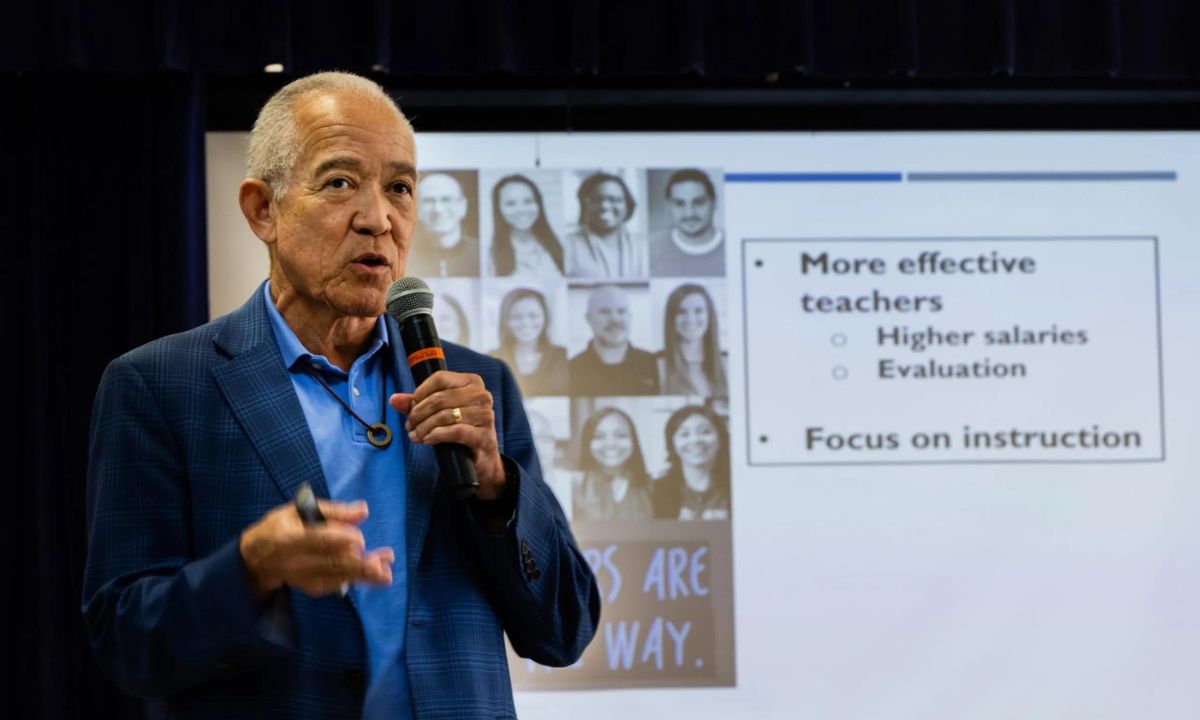Dozens of Houston ISD Schools Will Be Required to Make 12% Budget Cuts Next Year
Failing enrollments are forcing budget cuts on Houston ISD.

Help fund stories like this. Donate now!
Houston ISD Superintendent Mike Miles will require roughly two dozen schools to cut 12 percent of their budgets next year, initiating a painful but expected process meant to bring campus-level spending in line with declining enrollments.
The cuts will target schools not participating in Miles’ “New Education System” next year, whose budgets are managed by campus principals. HISD manages the budgets of schools in the NES program and funds them at a significantly higher level than other schools.
On Tuesday, HISD provided half of the district’s principals with preliminary information about their campus budgets for next year and plans to provide information to the other half Wednesday. Most of HISD’s roughly 140 non-NES principals will have to make cuts in their spending, capped at a 12 percent reduction, due to decreases in the number of students attending their schools.
Roughly 25 schools will have to slash the maximum 12 percent, while about 35 schools will see increases to their budgets, Miles estimated in a Monday interview with the Houston Landing. That leaves dozens more schools to reduce spending between 1 and 12 percent. HISD declined to say which schools will be subject to the steepest cuts.
The tough financial pill stems from a decision by Miles to end HISD’s pandemic-era policy to insulate schools from budget cuts, even when their enrollment and attendance decline. With pandemic relief money set to soon run out and with HISD expected to run a $250 million to $300 million deficit this year, Miles said it is time to bring spending in line with student counts.
“People have known this is coming,” Miles said. “If they’ve lost 100 kids, they are going to have to cut some staff. At some point, we do have to stop paying for kids who actually aren’t there.”
In recent years, HISD has lost about 32,000 students, down from about 216,100 in 2016-17 to 183,900 in 2023-24. Since the policy of not reducing schools’ budgets based on attendance went into effect, more than 150 schools have lost 12 percent or more of their student enrollments, including more than 60 non-NES schools.
In total, the cuts will save about $15 million across the district, Miles said. The savings represent a small component of extensive cuts and efficiencies Miles has said he plans to make next year. However, they represent the first time Miles has outlined plans likely to result in widespread staffing reductions at the campus level.
Due to a lengthened school year in 2024-25 and a dramatic increase in the number of overhauled schools paying teachers salaries $10,000 to $20,000 above their typical rates, HISD plans to spend an additional $114 million on staff next year, including $74 million at NES schools, according to Chief of Human Resources Jessica Neyman. Miles has said he plans to present a draft budget proposal for next year’s spending to HISD’s board of managers in May.
Schools undergoing Miles’ transformation, which typically have a quarter to a third more employees than other HISD schools, also will be subject to limited staffing cuts if they have lost students, Miles said. He estimated NES schools could lose one to two non-teaching roles.
Former Love Elementary Principal Sean Tellez, who resigned in early March, said he thinks the cuts fall unfairly on schools not participating in Miles’ overhaul program. The end of the policy insulating campuses from attendance-related budget cuts did not surprise him, because former HISD Superintendent Millard House’s administration had warned it was coming. However, he thought the whole district would be subject to the painful spending decisions, rather than just the half not participating in Miles’ NES program.
As a principal, Tellez had to make budget cuts, including last year reducing the work hours of the Love Elementary nurse and librarian, eliminating a technology role and cutting a front office worker. If he were forced to eliminate 12 percent of his spending, he would have to cut at least one teacher and it would be “virtually impossible” to keep students from feeling the losses, he said.
“The overwhelming vibe, or feeling, amongst the non-NES principals has been, because we’re not NES, we’re going to have to bear the burden of this increased budget for NES schools and we’re going to be on our own,” Tellez said.
Researcher Chad Aldeman, who previously served as policy director at Georgetown University’s Edunomics Lab and now runs the organization Read Not Guess, studies school enrollment and staffing trends nationwide. Across the country, most school districts have seen increasing numbers of staff-per-student ratios since the pandemic, mostly due to student headcounts falling faster than staffing levels, he said, creating looming budgetary difficulties.
However, while making cuts to balance staffing levels may be necessary in many instances, it rarely is straightforward, Aldeman explained.
“Let’s say you lose 20 students across an elementary, they’re not going to be all in one grade. … So, you might lose two students or two-and-a-half students from every grade, and you can’t just reduce your staff by one fourth-grade teacher,” Aldeman said. “None of these things are fun. They’re not good for kids.”
Miles said he empathizes with principals now facing dreaded decisions, but said he had no other choice. HISD is easing the process for principals by covering certain expenses, such as approved curricular materials, he said.
“I’ve been a principal, I’ve been a charter school principal, and I know what it is to have to do a budget and I know what a cut looks like, even a 10 percent cut,” Miles said. “If I can protect the classroom from any cut, that’s what we’re going to do. But we do have to live within our means now.”
This article first appeared on Houston Landing and is republished here under a Creative Commons license.
Help fund stories like this. Donate now!

;)